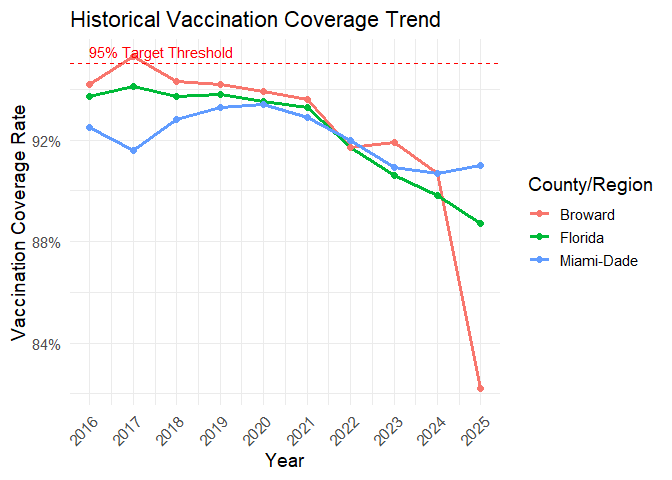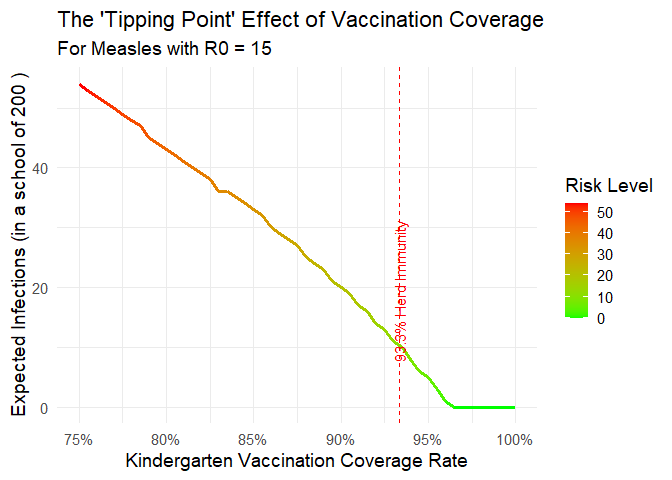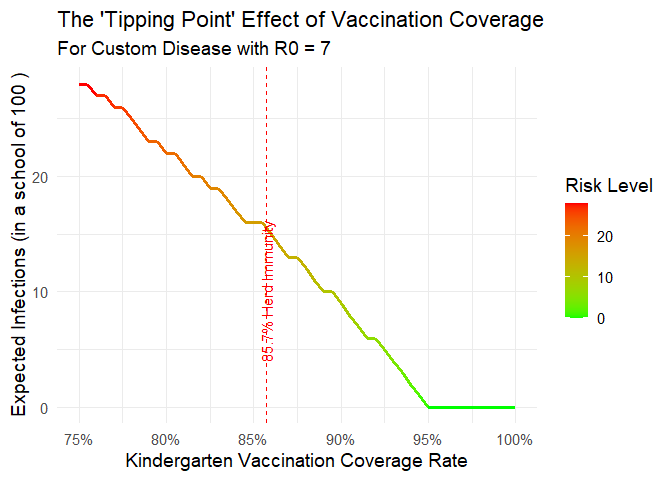
The hardware and bandwidth for this mirror is donated by dogado GmbH, the Webhosting and Full Service-Cloud Provider. Check out our Wordpress Tutorial.
If you wish to report a bug, or if you are interested in having us mirror your free-software or open-source project, please feel free to contact us at mirror[@]dogado.de.

vaxineR is an R package for analyzing kindergarten
vaccine coverage data and modeling potential infectious disease outbreak
risks. It provides functions to calculate key epidemiological metrics,
generate summary tables, and create insightful visualizations based on
historical Florida county data.
You can install the development version of vaxineR from GitHub with:
# install.packages("devtools")
devtools::install_github("YOUR-GITHUB-USERNAME/vaxineR")library(vaxineR)
library(dplyr)
#>
#> Attaching package: 'dplyr'
#> The following objects are masked from 'package:stats':
#>
#> filter, lag
#> The following objects are masked from 'package:base':
#>
#> intersect, setdiff, setequal, unionCalculate the expected number of measles infections in a school of 100 students where vaccination coverage is 88%.
calc_expected_infections(
vc = 0.88,
VE = 0.97,
disease = "Measles",
kindergarten_size = 100
)
#> [1] 13Quickly assess the situation for a given year. The table shows risk scenarios for the statewide average and counties at different coverage quantiles.
summary_infection_risk(yr = 2024, disease = "Measles", VE = 0.97)
#> # A tibble: 6 × 7
#> Scenario `Vaccination Coverage` `Effective R (Re)` Susceptible (N = 200…¹
#> <chr> <chr> <dbl> <dbl>
#> 1 Statewide Av… 89.8% 1.93 26
#> 2 Minimum 83.4% 2.87 39
#> 3 25th Percent… 88.9% 2.06 28
#> 4 Median 91.4% 1.7 23
#> 5 75th Percent… 93.0% 1.48 20
#> 6 Maximum 96.6% 0.94 13
#> # ℹ abbreviated name: ¹`Susceptible (N = 200)`
#> # ℹ 3 more variables: `Expected Infections` <dbl>,
#> # `Prob >=1 Secondary Case` <chr>, `Prob Major Outbreak` <chr>Plot the vaccination coverage history for a few key counties.
plot_coverage_history(county_name = c("Florida", "Miami-Dade", "Broward"))
Visualize the non-linear “tipping point” of outbreak risk. We will also save the underlying data to an Excel file, which will contain both the data and a metadata sheet describing it.
plot_risk_curve(
disease = "Measles",
VE = 0.97,
kindergarten_size = 200,
save_data_to = "measles_risk_curve_data.xlsx"
)
#> Plot data and metadata saved to 'measles_risk_curve_data.xlsx'
The generated file measles_risk_curve_data.xlsx will now
be in your working directory.
You can model any hypothetical disease by setting disease = “Custom” and providing a value for r0_custom.
plot_risk_curve(
disease = "Custom",
VE = 0.90,
r0_custom = 7,
kindergarten_size = 100
)
These binaries (installable software) and packages are in development.
They may not be fully stable and should be used with caution. We make no claims about them.
Health stats visible at Monitor.